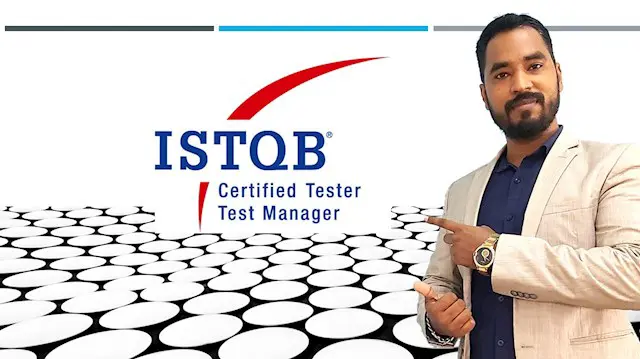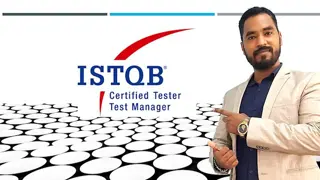
ISTQB Advanced Test Manager 2022 & Sample Questions
Gain Skills of Managing a Test organization and Be a certified ISTQB Test Manager
Neeraj Singh
Summary
- Reed courses certificate of completion - Free
- Tutor is available to students
Add to basket or enquire
Overview
13+ hours of Mobile Application Testing concepts/skills to prepare you and help you enhance your profile as a Test Analyst or Test Lead. Also, the course prepares you to Get certified with ISTQB Advance Test Analyst & add quality to your process and build a competitive profile.
This course covers the end-to-end syllabus discussion, Sample Questions, Tips & Tricks for exams and Time Management.
Note: This course is the only training of the certification that doesn't include the exam.
Curriculum
-
Introduction to ISTQB Test Manager 09:38
-
Chapter 1 - Testing Process 1:40:18
-
Chapter 2 - Test Management 5:14:09
-
Chapter 3 - Reviews 1:12:16
-
Chapter 4 - Defect Management 1:14:08
-
Chapter 5 - Improving the Testing Process 1:13:01
-
Chapter 6 - Test Tools and Automation 1:29:05
-
Chapter 7 - People Skils-Team Composition 1:38:03
Course media
Description
Note: There are few topics that were removed in the new syllabus so you may observe improper order in Chapter 1 but it still covers beyond the need.
Learners will get to learn more in details about
Testing Process.
-
Introduction
-
Test Planning, Monitoring and Control
-
Test Planning
-
Test Monitoring and Control
-
-
Test Analysis
-
Test Design
-
Test Implementation
-
Test Execution
-
Evaluating Exit Criteria and Reporting
-
Test Closure Activities
2. Test Management.
-
Introduction
-
Test Management in Context
-
Understanding Testing Stakeholders
-
Additional Software Development Lifecycle Activities and Work Products
-
Alignment of Test Activities and Other Lifecycle Activities
-
Managing Non-Functional Testing
-
Managing Experience-Based Testing
-
-
Risk-Based Testing and Other Approaches for Test Prioritization and Effort Allocation
-
Risk-Based Testing
-
Risk-Based Testing Techniques
-
Other Techniques for Test Selection
-
Test Prioritization and Effort Allocation in the Test Process
-
-
Test Documentation and Other Work Products
-
Test Policy
-
Test Strategy
-
Master Test Plan
-
Level Test Plan
-
Project Risk Management
-
Other Test Work Products
-
-
Test Estimation
-
Defining and Using Test Metrics
-
Business Value of Testing
-
Distributed, Outsourced, and Insourced Testing
-
Managing the Application of Industry Standards
3. Reviews.
-
Introduction
-
Management Reviews and Audits
-
Managing Reviews
-
Metrics for Reviews
-
Managing Formal Reviews
4. Defect Management.
-
Introduction
-
The Defect Lifecycle and the Software Development Lifecycle
-
Defect Workflow and States
-
Managing Invalid and Duplicate Defect Reports
-
Cross-Functional Defect Management
-
-
Defect Report Information
-
Assessing Process Capability with Defect Report Information
5. Improving the Testing Process.
-
Introduction
-
Test Improvement Process
-
Introduction to Process Improvement
-
Types of Process Improvement
-
-
Improving the Testing Process
-
Improving the Testing Process with TMMi
-
Improving the Testing Process with TPI Next
-
Improving the Testing Process with CTP
-
Improving the Testing Process with STEP
6. Test Tools and Automation.
-
Introduction
-
Tool Selection
-
Open-Source Tools
-
Custom Tools
-
Return on Investment (ROI)
-
Selection Process
-
-
Tool Lifecycle
-
Tool Metrics
7. People Skills – Team Composition.
-
Introduction
-
Individual Skills
-
Test Team Dynamics
-
Fitting Testing Within an Organization
-
Motivation
-
Communication
Who is this course for?
Anyone who is looking forward to be a Test Manager
Anyone who wants to lead a test project effectively
Anyone who want to contribute better to projects and their decision making
Requirements
Must be certified with ISTQB Foundation Level
Career path
On course completion, you will be able to fulfill the criteria and knowledge required to begin/grow higher in your journey as a Test Manager.
A Test Manager is responsible for Test Planning, Monitoring, Controlling, Decision Making, Team Management, etc
Questions and answers
Currently there are no Q&As for this course. Be the first to ask a question.
Certificates
Reed courses certificate of completion
Digital certificate - Included
Will be downloadable when all lectures have been completed
Reviews
Currently there are no reviews for this course. Be the first to leave a review.
Legal information
This course is advertised on reed.co.uk by the Course Provider, whose terms and conditions apply. Purchases are made directly from the Course Provider, and as such, content and materials are supplied by the Course Provider directly. Reed is acting as agent and not reseller in relation to this course. Reed's only responsibility is to facilitate your payment for the course. It is your responsibility to review and agree to the Course Provider's terms and conditions and satisfy yourself as to the suitability of the course you intend to purchase. Reed will not have any responsibility for the content of the course and/or associated materials.


